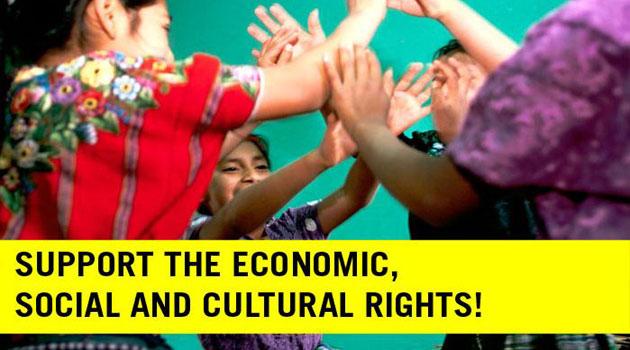People who have their economic, social and cultural rights routinely trampled on are set to gain a fresh route to justice via the UN – but once in force it will only immediately apply to 10 nations, Amnesty International said.
The new complaints mechanism, established by the Optional Protocol to the International Covenant on Economic, Social and Cultural rights (the Protocol), will allow individuals and groups to seek justice from the UN if their rights – including adequate housing, food, water, sanitation, health, work, social security and education – are violated and their government fails to provide justice.
“Access to justice is essential for victims of all human rights violations and the Protocol is a key step towards accomplishing this,” said Salil Shetty, Secretary General of Amnesty International.
“Almost 40 years after the equivalent Protocol to the International Covenant on Civil and Political Rights came into force we have finally achieved parity between the two treaties and meaning to the principle of indivisibility of all rights.
“We congratulate the first ten countries that have ratified the Protocol but all other states must follow. For human rights to be truly achieved, everyone whose human right is violated must have an effective remedy.”
Uruguay today provided the crucial tenth ratification of the Protocol, which means it will be in force in three months time on 5 May 2013.
Despite this significant step, not a single African country is party to the Protocol, while Mongolia is the only Asian country to ratify it. Globally 160 countries are parties to the International Covenant on Economic, Social and Cultural rights and are therefore in a position to also ratify the Protocol.
The Protocol is only legally binding in those countries which are party to it.
“Governments have too often only paid lip service to their obligations under international law to ensure economic, social and cultural rights for all,” said Shetty. “The reality is that in many countries there are no effective mechanisms to address the violations many people suffer.”
The Protocol enables people, who have suffered violations such as being forcibly evicted from their homes, or denied an education because of where they live, to have their complaints heard in front of an independent, international panel of experts once they have exhausted all domestic options.
Amnesty International has documented many cases around the world where people are finding it impossible to obtain justice for such violations, and for whom the Protocol could be crucial.
In Nigeria, more than 13,000 people were forcibly evicted in August 2009 when a local government ignored a court order and destroyed their waterfront settlement.
In Slovenia, the government has failed to help the many Roma families who today are living without water or sanitation in informal settlements.
In the USA, the government’s failure to ensure that all women have access to maternal health services reduces their chances of having a healthy pregnancy and delivery.
“The Protocol establishes a vital tool for people, in particular for those living in poverty, to hold their government accountable for their rights – otherwise violations can continue with impunity,” said Shetty.
The ten states that have ratified so far are Argentina, Bolivia, Bosnia & Herzegovina, Ecuador, El Salvador, Mongolia, Portugal, Slovakia, Spain and Uruguay.
The decisions made through this new mechanism are likely to influence national and regional courts around the world.
"In additional to joining the Protocol, governments must also ensure that there are national mechanisms in place such as courts and human rights commissions with the mandate and capacity to enforce economic, social and cultural rights." said Shetty.
Background
The Protocol was adopted by the UN General Assembly by consensus on December 10, 2008 and was opened for ratification on September 24, 2009. Thirty–two other countries have signed the Protocol, indicating their intention to ratify, but ratification is necessary to make the Protocol legally binding.
Argentina, Bolivia, Bosnia & Herzegovina, Ecuador, El Salvador, Mongolia, Portugal, Slovakia, Spain and Uruguay have ratified the Optional Protocol. The 32 other countries who have signed the Optional Protocol and need to ratify it are Armenia, Azerbaijan, Belgium, Burkina Faso, Cape Verde, Chile, Congo, Costa Rica, Democratic Republic of the Congo, Finland, France, Gabon, Ghana, Guatemala, Guinea-Bissau, Ireland, Italy, Kazakhstan, Luxembourg, Madagascar, Maldives, Mali, Montenegro, Netherlands, Paraguay, Senegal, Slovenia, Solomon Islands, Timor-Leste, Togo, Ukraine and Venezuela.
160 countries around the world are Party to the International Covenant on Economic, Social and Cultural Rights (ICESCR). The ICESCR provides the main legal framework for the protection and promotion of economic, social and cultural rights. Economic, social and cultural rights include the rights to work, health, education, food, water, sanitation, adequate housing, social security, and the right to take part in cultural life, amongst others. All States that are parties to the ICESCR are obliged under international law to respect, protect and fulfil these rights for all, without discrimination.
Amnesty International is part of the global NGO Coalition for an Optional Protocol to the International Covenant on Economic, Social and Cultural Rights, made up of more than 300 civil society groups globally. It has been campaigning for the last eight years for the Protocol and is calling on all governments worldwide to ratify it.
This work is part of Amnesty International’s Demand Dignity Campaign, which focuses on human rights violations that drive and deepen poverty. As part of the campaign, Amnesty International is calling on all governments to ensure that victims of human rights violations, including economic, social and cultural rights have effective national and international remedies. Amnesty International is calling on all governments to ensure that economic, social and cultural rights are enforceable in national law, remove obstacles to access to justice and comply with the human rights decisions of courts and international human rights mechanisms.
